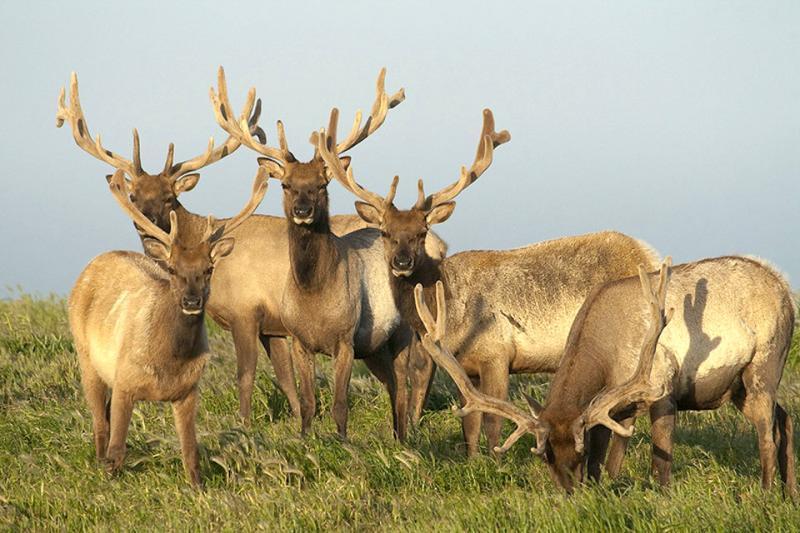
A lawsuit filed in federal court Monday challenges a livestock management plan adopted at Point Reyes National Seashore/George Wuerthner
Editor's note: This corrects that more than 20 families, not five, hold leases in the agricultural zone at Point Reyes.
A lawsuit brought in federal court on Monday challenges the National Park Service's plan for managing agriculture and wildlife at Point Reyes National Seashore in California. At the heart of the filing is a claim that the Park Service is embracing cattle ranches to the detriment of native Tule elk in the seashore.
The National Park Service has "prioritized the commercial needs of ranchers instead of providing maximum protection to the natural environment and supporting the public’s use and enjoyment of these majestic lands along the California coast," argues the lawsuit, filed by the Resource Renewal Institute, Center for Biological Diversity, and Western Watersheds Project.
The lawsuit (attached below) filed in U.S. District Court for the Northern District of California attacks a plan adopted last September that the Park Service said would serve as a "model where wilderness and ranching can coexist side-by-side."
The management plan addresses lands, resources, development, and visitor use in a 28,000-acre section of the national seashore. Outside groups immediately criticized the plan, claiming that 24 cattle and dairy operations that have operated within the seashore since its inception pollute and adversely impact the environment (water quality, methane emissions, erosion, fish habitat), the infrastructure (pavement degradation from milk trucks), and recreational opportunities.
The plan allows for culling of Tule elk if population numbers get out of hand.
"This plan is a giveaway to the cattle industry,” said Deborah Moskowitz, president of the Resource Renewal Institute. “It perpetuates decades of negligence by the very agency charged with protecting this national treasure. The Trump administration fast-tracked the plan without regard for the climate crisis or the hundred rare, threatened and endangered species that depend on this national park. One-third of the national seashore is fenced off from public use.”
In recent years, the ranch operations have drawn harsh criticism for impacts to the landscape and to the Tule elk herds. Tule elk are the smallest elk subspecies in North America and a California native. They had been extirpated from Point Reyes by the 1860s, but in 1978 the Park Service brought some back at the direction of Congress.

The lawsuit alleges the Park Service is giving cattle priority over native Tule elk/NPS
There are three herds at the seashore: Drakes Beach, Limantour, and Tomales Point. The Tomales Point herd is managed within a fenced-in area, while the Drakes Beach and Limantour herds are free-ranging.
“The Park Service has long mismanaged Point Reyes by allowing ranchers to use and abuse the park for private profit,” said Jeff Miller with the Center for Biological Diversity. “Now the agency wants to treat our beloved Tule elk as expendable problem animals to be shot or removed. Point Reyes belongs to the public, not a handful of ranchers. It’s time to manage the park the way Congress intended when it passed the Point Reyes Act — for public benefit and protection of the natural environment.”
According to the plaintiffs, the management plan violates several federal environmental laws, including the Point Reyes Act, which established the Point Reyes National Seashore in 1962 for the purposes of “public recreation, benefit and inspiration;” the National Park Service Organic Act, which requires the agency to leave natural resources “unimpaired” for the benefit of future generations; and the Clean Water Act by allowing ranches to circumvent water quality standards. They also claim the Park Service’s environmental review for the plan was inadequate and so violates the National Environmental Policy Act.
“The Park Service needs to stop authorizing chronic water contamination, harassment and suppression of Tule elk, degradation of public recreation and destruction of native coastal prairies for the sake of a handful of unsustainable ranching operations,” said Laura Cunningham, California director at Western Watersheds Project. “Having studied California’s native grasslands for decades, I’m shocked at the destruction of native ecosystems and the epidemic of invasive weeds at the Point Reyes Seashore, and the agency’s callous disregard of its mandate to protect and preserve the park’s ecosystems and wildlife for the use and enjoyment of the people.”
The plaintiffs — the Resource Renewal Institute, Center for Biological Diversity and Western Watersheds Project — first sued the Park Service in 2016 for failing to update its General Management Plan and perpetuating commercial ranching in the park without adequate environmental review and public comment.
The plaintiffs and the Park Service, together with the ranchers and the County of Marin, entered into settlement negotiations. The court approved a multi-party Settlement Agreement on July 14, 2017.
Per that agreement, the Park Service agreed that in lieu of a Ranch Comprehensive Management Plan, it would prepare a General Management Plan Amendment and Environmental Impact Statement addressing the management of the lands currently leased for ranching in Point Reyes and the north district of Golden Gate.
Under the ensuing plan, ranching leases for more than 20 families can be extended 20 years. Under the framework, the Park Service is expected to:
- Incorporate management actions and grazing regimes that promote habitat heterogeneity, connectivity, and species that are considered ecosystem engineers into individual ROAs as appropriate.
- Identify and require implementation of actions to modernize Manure and Nutrient Management systems on dairies consistent with USEPA, state, and San Francisco Bay RWQCB requirements. Incorporate and prioritize water quality improvement management actions in individual ROAs with anticipated timing to ensure resource protection outcomes are realized.
- Regulate all beef ranches under a framework consistent with Tomales Bay watershed to ensure all operations adhere to a parkwide standard.
- Evaluate lighting on all ranch buildings and noise from farm machinery and equipment to determine best practices and incorporate relevant mitigation measures from into individual (Ranching Operating Agreements).



Add comment